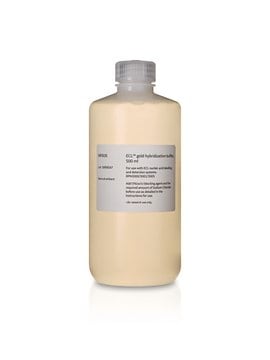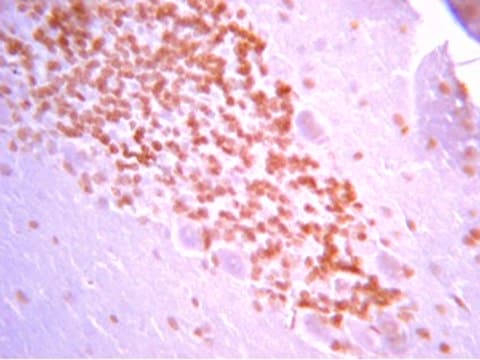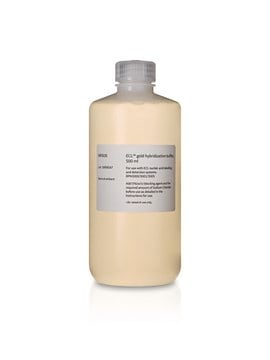GERPN3001
ECL™ Direct Nucleic Acid
Cytiva RPN3001, pack of 1 ea
Sign Into View Organizational & Contract Pricing
All Photos(1)
About This Item
UNSPSC Code:
41105300
NACRES:
NA.31
Recommended Products
packaging
pack of 1 ea
manufacturer/tradename
Cytiva RPN3001
storage temp.
2-8°C
Related Categories
General description
ECL™ Direct Labeling and Detection System.
Application
ECL™ Direct Nucleic Acid Labeling and Detection Systems are based on the direct labeling of DNA or RNA probes with horseradish peroxidase (HRP) in a simple 20 min chemical reaction. The resulting probe can be used without purification. Detection is achieved by generation of light via the HRP-catalyzed breakdown of luminol.
Each system includes the following reagents, sufficient for labeling 5 to 10 μg nucleic acid and detecting 2000 to 4000 cm2 of membrane (depending on product ordered): labeling reagent, crosslinker, control DNA, blocking agent, ECL™ Detection Reagents, and ECL™ Gold Hybridization Buffer.
Each system includes the following reagents, sufficient for labeling 5 to 10 μg nucleic acid and detecting 2000 to 4000 cm2 of membrane (depending on product ordered): labeling reagent, crosslinker, control DNA, blocking agent, ECL™ Detection Reagents, and ECL™ Gold Hybridization Buffer.
Features and Benefits
- Direct probe labeling in a 10 min reaction, 1 h from hybridization to detection with ECL™ Direct, Hybond® N+, and Hyperfilm ECL.
- Eliminates handling, waste, and regulatory issues associated with the use of radioactivity.
- No need to strip blots before reprobing.
- For fast and easy detection of medium- to high-target amounts in applications such as colony/plaque screens, dot blots, and PCR product analyses.
- Consistent results combining strong signals with very Low backgrounds.
Storage and Stability
Please be aware this product may be shipped 90 days before the expiration date. For more information on the batch specific expiration date, please contact technical service.
Analysis Note
To view the Certificate of Analysis for this product, please visit www.cytiva.com.
Legal Information
ECL is a trademark of Cytiva
Hybond is a registered trademark of Cytiva
related product
Product No.
Description
Pricing
Signal Word
Danger
Hazard Statements
Precautionary Statements
Storage Class Code
12 - Non Combustible Liquids
Certificates of Analysis (COA)
Search for Certificates of Analysis (COA) by entering the products Lot/Batch Number. Lot and Batch Numbers can be found on a product’s label following the words ‘Lot’ or ‘Batch’.
Already Own This Product?
Find documentation for the products that you have recently purchased in the Document Library.
Shin-Ichi Miyata et al.
Microbiology (Reading, England), 149(Pt 8), 2243-2250 (2003-08-09)
Thymidylate kinase (TMK) catalyses the phosphorylation of dTMP to form dTDP in both the de novo and salvage pathways of dTTP synthesis in both prokaryotes and eukaryotes. Two homologues of bacterial thymidylate kinase genes were identified in a genomic library
Yasuko Kimura et al.
Yeast (Chichester, England), 19(16), 1437-1445 (2002-12-13)
We recently discovered, on the chromosome of Saccharomyces cerevisiae sigma 1278b, novel MPR1 and MPR2 genes required for resistance to a toxic analogue of L-proline, L-azetidine-2-carboxylic acid. The MPR genes, which were absent in the S. cerevisiae genome project strain
S Olschwang et al.
Journal of medical genetics, 38(6), 356-360 (2001-06-05)
Germline mutations of the STK11/LKB1 tumour suppressor gene (19p13.3) are responsible for Peutz-Jeghers syndrome (PJS), a rare genetic disorder, which is dominantly inherited. In addition to the typical hamartomatous gastrointestinal polyps and perioral pigmented lesions, PJS is also associated with
Senia Rosales et al.
BMC microbiology, 10, 208-208 (2010-08-04)
Tuberculosis persists as a public health problem in Honduras. A better knowledge of the molecular characteristics of Mycobacterium tuberculosis strains will contribute to understand the transmission dynamics of the disease within the country. The aim of this study was to
C Couturier et al.
Arteriosclerosis, thrombosis, and vascular biology, 20(12), 2559-2565 (2000-12-16)
Type II secreted phospholipase A(2) (sPLA(2)) releases precursors of important inflammatory lipid mediators from phospholipids. Some observations have indicated that the sPLA(2), which has been implicated in chronic inflammatory conditions such as arthritis, contributes to atherosclerosis in the arterial wall.
Articles
Background and protocols describing the various methods used by molecular biologists to detect samples of protein or nucleic acids bound to membranes.
Our team of scientists has experience in all areas of research including Life Science, Material Science, Chemical Synthesis, Chromatography, Analytical and many others.
Contact Technical Service









